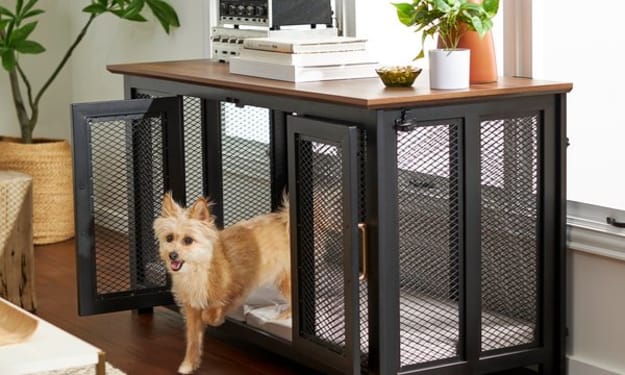
Dog Stomach swelling can be quiet a life-threatening emergency for both the dog and its owner as well, or it likewise be something as simple as your dog having eaten too much.
To keep your dog or canine companion in perfect shape and good health, it does help to know and recognize the signs a dog can portray or display when it has stomach problems..
Bloated Dog: The Common Causes and Treatments
Because stomach swelling or bloated stomach in dogs can be quiet dangerous, you should endeavour to never try to diagnose the cause of your dog's bloated stomach at home or yourself especially without the help from a professional especially if do not know what you are doing or are not trained prior to the experience. If your dog's abdomen is looking quiet swollen or unusual, get your pet immediately to a veterinary hospital or emergency veterinarian, preferably the nearest one you can find or locate, as timing can be very critical to its survival.
Some of the causes of swollen stomach in dogs include:
Cause 1.. Bloat / Gastric Dilation Volvulus
Usually Called "the mother of all emergencies," The untreated gastric dilatation and volvulus (GDV) can actually be fatal to a dog within just very few hours. Bloat usually happens when present gas or food does stretch a dog's stomach. GDV usually happens when this distended stomach starts to rotate, trapping certain gas inside, and just as well blocking off the blood supply to the dog’s stomach.
Usually Extremely painful, However there doesn't seem to be just one cause resulting to GDV, though swallowing air majorly plays a part; Your Dog not resting but getting involved in heavy exercise after a meal can just as easily be a trigger, too. The exact cause of GDV itself is still on debate. A few of the many proposed factors which are likely to increase a dog's GDV risk include:
Your Dog Being deep-chested. Certain dog Breeds like the Great Dane, St. Bernard, and Weimaraner are usually at the greatest risk for having bloated stomach; in a nutshell, dogs which weigh over 99 pounds do have a 20% bloat risk. Though this can be quiet rare, small dogs can also suffer from this condition as well, but not as much as their bigger counterparts.
Dog’s which are usually fed just one meal a day.
Utilizing high or elevated food and water bowls.
Dog’s which have a family history of bloat/GDV
Allowing your dog to eat too quickly and not being able to control his eating habits or behavior.
Dog’s which are quiet older; usually dogs which are between ages of 7-12 years are at the highest risk.
Treating a bloated dog’s stomach does requires immediate, fast and emergency care and may include processes of decompressing the affected dog’s stomach (process of getting rid of excess gas from the stomach), controlling shock, and stabilizing the heart, usually followed by surgery once the dog is stable. If your canine's abdomen looks quiet swollen or distended, or in situations where your pet seems uncomfortable, don't wait any second any longer; immediately rush your pet to a vet hospital.
Preventing or completely avoiding a bloat usually is hard because of the numerous factors which may play a part in causing it in the first place, but a few things you can do that could sure reduce your dog's risk include:
Make sure to Feed your dog two or more meals every day.
Include some canned food in His meals
Make certain that your dog does rest after a full meal; no strenuous exercise on a full stomach.

Cause 2.. Peritonitis
This is another possible and present cause we cannot rule our completely, this serious intestinal infection is usually caused by a puncture or a rupture of your pooch's stomach or intestine, due to improperly grounded splinters from a bone when eating bones, ulcers, tumors, or even other causes. Peritonitis can also affect your dog if its gallbladder or urinary bladder ruptures this also does require immediate medical attention upon noticing the bloat.
Usually extremely painful, a dog with peritonitis may be restless, very reluctant to move, even have a swollen abdomen, or start to vomit as an indication. Shock is likely, so emergency treatment is crucial as early advised.
The Treatment for peritonitis may likewise include use of intravenous fluids, certain antibiotics, and pain relief administration as well. Surgery will also be very necessary to repair the said puncture to get the dog back to better health, This will help with removing the infected fluids, and flushing away the abdomen.
Cause 3.. Cushing's Syndrome
Usually a canine with a bloated-bellied look may also be because he has hyperadrenocorticism, or a condition called the Cushing's syndrome, this condition is mainly and usually caused by the overproduction of a certain hormone called cortisol. This is mostly common and present in dogs which are 6 years or older, other present signs of the Cushing's syndrome include eating, drinking, and perhaps even urinating more, as well as your dog loosing hair and increased panting.
This Cushing's syndrome as a condition is usually caused by the pituitary glands over production of a certain hormone; less commonly so, it can also be due to a tumor which is located on one of the adrenal glands. Recently in modern science there is a newer medication which treats both forms of this present Cushing’s syndrome. However, a good surgery can be done to eradicate the tumor once and for all which is associated with the adrenal form of Cushing’s syndrome.
Cause 4.. Ascites
Ascites as condition causing bloated dog stomach is the accumulation of fluid substances in your canine’s abdomen, this usually leads to your dog having something like a pot-belle, this is usually strange to notice or look at. Ascites can usually be caused by a very wide range of factors and problems as well, these may include heart-failure, liver disease, even kidney problems, or intense intestinal diseases. Treatment for ascites does vary depending upon the condition which is causing it.
Other Causes of Dog Stomach Swelling are highlighted below:
Stomach bloating in canine’s can also result from something as mere as your dog eating or consuming too much food all at once, Dog internal bleeding caused by trauma or a ruptured mass, pooch intestinal obstruction, or certain tumors. In puppies this can also be caused by Severe roundworm infection which can also cause a swollen abdomen in dogs.
Helpful Tips to Prevent Stomach Problems in Your Dog
To better help the prevention of stomach problems, ensure to keep the following steps.
1.Be sure to take your canine for regular vet appointments and checkups so that it is possible for your vet to keep tabs on the health of your pet's vitals such as their heart, lungs, bowel, stomach and other organs as well.
2.A quick exam of your dog's abdomen can also help you recognize some of the signs of stomach trouble. To examine your dog's stomach, feel for tenderness to touch, heat, stickiness, lumps, and of course, swelling. Take your dog to the vet right away if you notice any problems.
About the Creator
A.O
I am a content writer who writes about blogging, YouTube, Relationships, How-To's, Medium, Quora, Travel, self interests And In-between.






Comments
There are no comments for this story
Be the first to respond and start the conversation.